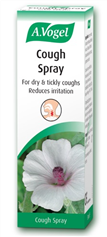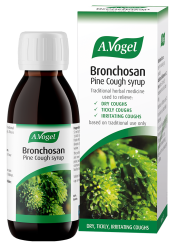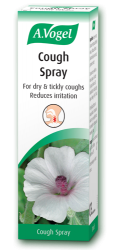What is a dry cough?
A dry cough is a type of cough which produces little or no mucus or phlegm. It is closely related to tickly coughs and often, these terms are used interchangeably. Both dry coughs and tickly coughs are known as non-productive coughs, as distinct from chesty coughs where mucus is produced.
A dry cough is most often the result of infection by cold and flu viruses or caused by irritation to nerve enedings in the throat. They are often triggered by atmospheric pollutants (such as cigarette smoke) irritating your throat. In most of these situations, dry coughs occur because the back of your throat (or pharynx) becomes irritated or inflamed, but may also arise from deeper in the chest if stubborn mucus is present.
Any cough can be a nuisance and this is particularly so if sleep is disturbed. A vicious cycle can develop - if one is tired, recovery from any infection or illness can take longer.
Common causes of dry coughs
The common causes of dry coughs are as follows:
- Viral infections - common examples include the common cold and flu. Coughs as a result of these infections may occur at the start of the illness or more likely, appear towards the middle or the end of the infection, and may linger long after other symptoms have disappeared
- Post-nasal drip – this is characterised by excess mucus forming in the nasal cavity which drips down the back of the throat. Over time post-nasal drop can irritate the nerves at the back of the throat and trigger a dry cough
- Allergies - Hayfever, an allergy to grass and tree pollen, can cause irritation to the eyes and nose and when the throat is affected, a cough results. If you are unsure about whether or not your dry cough is hayfever-related, you could try taking our quick test to find out. Sensitivity to other particles such as animal fur or dust, collectively known as allergic rhinitis, can also contribute to dry coughs. Coughs as a result of these issues can often be more persistent, especially if the allergen is constantly nearby!
- Pollution - Less obvious allergens such as air pollutants can also irritate the back of the throat causing a dry cough
- Acid reflux - digestive complaints such as acid reflux or heartburn are now more readily accepted as a cause of dry coughs. As the acidic contents of the stomach travel upwards to the back of the throat this can cause irritation or minute amounts of acid may even enter the upper respiratory tract, causing inflammation and further symptoms. Coughing as a result of acid reflux is more likely when one is lying down flat. Acid reflux is a prominent element of GORD or GERD (Gastro-oesophageal Reflux Disease)
- Smoking – although a smoker’s cough is typically chesty, this may start off as dry cough and gradually develop into a more chronic, chesty cough as your chest becomes more congested. When non-smokers are initially exposed to cigarette smoke (for example when entering into a smoky room) they will often naturally present with a dry cough.
Other causes of dry coughs
Other causes of a dry cough to be aware of include:
- Side-effects of medication – some medicines, particularly those for high blood pressure such as ACE inhibitors, can cause side effects such as persistent, dry coughs
- Psychological conditions – this is when coughing has become a habit or a nervous response. It is also sometimes referred to as a psychogenic cough. There is no physical illness behind the cough and often the person does not even realise he or she is coughing. A feature of this type of cough is that it goes away when one is asleep
- Nerves and stress – many people cough when they are in a stressful situation. Breathing becomes shallow when you are anxious and this can trigger the cough reflex. Some people tend to be more anxious than others, and for them the ‘natural’ nervous cough can become a problem if they find themselves in uncomfortable situations. Often, the underlying problem will have to be addressed in order to cure the dry cough
- Menopause – Although it isn’t commonly recognised, changing hormones can give rise to changes in the respiratory tract. As oestrogen levels drop off during menopause, this can dry out the mucous membranes which line our respiratory tract and in turn, this can give rise to symptoms such as wheezing and a dry cough. In some cases these symptoms may get mistaken for the development of a condition such as asthma!
Persistent dry coughs
A dry cough that lingers for more than three weeks may be the result of an underlying medical condition such as:
- Snoring or sleep apnoea – snoring and/or sleep apnoea can cause irritation to the back of the throat which over time can give rise to a persistent, dry cough upon waking
- Whooping cough – this is a bacterial disease caused by Bordetella pertussis characterised by bouts of coughing followed by gasping of air in a distinctive ‘whoop’ sound. It is not as common as it used to be although has made a bit of a comeback in recent years, especially in younger children
- Asthma – this is a common, chronic disease which can causes your airways to become inflamed and partially blocked during an attack. Asthma commonly develops in young children but can also develop later in life which is known as adult onset asthma. In suspected cases of adult onset asthma, other potential underlying causes such as the side effects of medication should always be ruled out first
- TB – Tuberculosis is a highly infectious bacterial disease which primarily affects the lungs. In the early stages, it gives rise to a persistent dry cough. TB was once thought to have become extinct throughout the world, but cases have increased recently because of a combination of drug resistance and lowered immune resistance
- Heart disease – this is one of the most common causes of ill-health in the Western world. Heart problems can eventually lead to heart failure and can contribute to a build up of fluid in the lungs and a persistent cough. Coughs as a result of heart conditions are often most troublesome at night
- More serious lung conditions – a persistent cough can also be a sign of other lung conditions, including lung cancer. It is always best to get this checked with your doctor if your symptoms persist and there is no obvious cause
Symptoms of a dry cough
Depending on the cause of your dry cough the symptoms may vary, however, some common symptoms can include:
- A dry or in some cases tickly cough – this isn’t a productive cough, meaning no mucus is present upon coughing
- A sore or tickly throat – this is often caused by irritation or inflammation of nerve endings in the throat
- Pain in the chest – muscles in the chest or even the abdomen can become strained if coughing is persistent
Remedies for dry coughs
Home remedies
- Keep properly hydrated – especially when it comes to a dry cough, drier mucous membranes will only add to the problem. Keep properly hydrated in order to help keep the throat moist and prevent further irritation. Aim to drink plenty of plain, still water daily – around 1.5l minimum and perhaps even more if you are fighting an infection, doing extra exercise or if are in a warmer environment
- Inject some extra vitamin C - Especially if your cough is the result of an infection, it could suggest that your immune system could do with some extra support. Vitamin C found in fruit is a great addition to your diet or why not add some slices of citrus fruits to some tea or hot water
- Honey - Traditionally used to help relieve sore throats, honey can be particularly useful to help soother dry or tickly coughs. Thick, sticky honey is soothing for the throat and tends to leave a protective layer on the tissues lining the back of the throat. Manuka honey has a Unique Manuka Factor (UMF) which is thought to be especially beneficial if an infection is present
- Steam inhalation – inhaling steam can help to hydrate a dry respiratory tract and may help to lessen some of the symptoms of a dry cough. Try adding a few drops of our Poho oil for best effects
- Rest up – especially if an infection has been at the root of the cause, resting will help support your immune system and the recovery process.
Herbal remedies
If the cause of your cough is obvious then treating the underlying problem is going to give you the best chance of relief:
For instance, echinacea can help the symptoms of the common cold (including coughs). Research has shown that it works by maintaining the body’s resistance to infection by strengthening the immune system.
If allergies or hayfever are at the root of the cause then Pollinosan may be helpful instead. Pollinosan Hayfever Tablets are non-drowsy and can help offer relief from the symptoms of hayfever and allergic rhinitis.
Then, to help target the symptoms of your dry cough more specifically, our Bronchosan Cough Syrup can come in helpful. Containing extracts of spruce or pine shoots this remedy is ideal for treating dry and tickly coughs coming from the throat.
Herbs such as Mullein and Marshmallow can help to treat dry coughs coming from both the throat and deeper down in the chest. This is especially useful if stuborn mucus is likely to be contributing to your cough.
Conventional remedies
Conventional medicines such as cough suppressants aim to reduce the activity of the cough reflex. Painkillers may also be offered as they may help with the irritation caused by persistent coughing but often won’t help tackle the underlying cause. We must also be careful not to take painkillers unnecessarily.
If an allergy is at the root of the cause conventional anti-histamine medications may help to manage your symptoms. PPI medications may be administered by your doctor if acid reflux is indicated.
Many cough medicines may be prescribed by your doctor or available without a prescription from a pharmacy. Please be aware that if you feel any medication from your doctor isn’t working you should return to them for them to investigate your symptoms further.
What to look out for
As we now know, dry coughs can also be caused by conditions other than cold or flu infections or allergies. It would be time to visit your doctor if you experience any of the following symptoms:
- If a child under 2 years is coughing – self medication isn’t suitable here
- You are pregnant and have developed a persistent cough (many remedies and medicines may not be suitable for you so best to double check)
- Suffer from a persistent, unexplained cough (longer than 3 weeks)
- Severe cough that’s getting worse rather than better
- Coughing up blood
- Shortness of breath
- Pain in your chest with your cough
- Changes in your voice
- Swelling or lumps forming in your neck
- Unexplained weight loss accompanying your cough
- Notice a fever with increase temperature or headaches.
Initial publication date: 18/07/2013 Update on: 24/08/18








